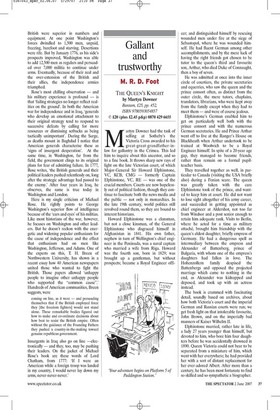Gallant and trustworthy
M. R. D. Foot THE QUEEN'S KNIGHT by Martyn Downer Bantam, £25, pp. 452, ISBN 9780593054857 © £20 (plus £2.45 p&p) 0870 429 6655 Martyn Downer had the task of selling at Sotheby's the Victoria Cross awarded to his great-great-grandfather-inlaw for gallantry in the Crimea. This led him to inquire about this ancestor, and so to a fine book. It throws sharp new rays of light on the late Victorian court, of which Major-General Sir Howard Elphinstone, VC, KCB, CMG — formerly Captain Elphinstone, VC, RE — was one of the crucial members. Courts are now hopelessly out of political fashion, though they continue to fascinate both the news media and the public — not only in monarchies. In the late 19th century, world politics still revolved round them, so they are bound to interest historians.
Howard Elphinstone was a clansman, but not a close kinsman, of the General Elphinstone who disgraced himself in Afghanistan in 1841. His own father, nephew in turn of Wellington's chief engineer in the Peninsula, was a naval captain who married a wife from Riga. Howard was the fourth son, born in 1829; was brought up a gentleman, but without prospects; became a Royal Engineer officer; and distinguished himself by rescuing wounded men under fire at the siege of Sebastopol, where he was wounded himself. He had fluent German among other accomplishments, and by the mere luck of having the right friends got chosen to be tutor to the queen's third and favourite son, Arthur, who died Duke of Connaught, then a boy of seven.
He was admitted at once into the inner circle of courtiers, the private secretaries and equerries, who saw the queen and the prince consort often, as distinct from the outer circle, the mere tutors, chaplains, translators, librarians, who were kept away from the family except when they had to meet them — and were of course jealous.
Elphinstone's German enabled him to get on particularly well both with the prince consort and with the numerous German secretaries. He and Prince Arthur went off to live at the Ranger's House on Blackheath when Arthur undertook to be trained at Woolwich to be a Royal Engineer himself. In spite of a 20-year age gap, they managed to become friends, rather than remain on a formal pupilteacher basis.
They travelled together as well, in particular to Canada (visiting the USA briefly also) during a Fenian scare. The queen was greatly taken with the care Elphinstone took of the prince, and wanted to keep him at court. He did not want to lose sight altogether of his army career, and succeeded in getting appointed as chief engineer at Aldershot, not too far from Windsor and a post senior enough to retain him adequate rank. Visits to Berlin, where he acted for a time as military attaché, brought him friendship with the queen's eldest daughter, briefly empress of Germany. He had a dangerous spell as intermediary between the empress and Alexander of Battenberg, prince of Bulgaria, with whom one of the empress's daughters had fallen in love. The Hohenzollern family despised the Battenbergs and opposed the projected marriage which came to nothing in the end, as Alexander was kidnapped and deposed, and took up with an actress instead.
The book is crammed with fascinating detail, soundly based on archives, about how both Victoria's court and the imperial German and Russian courts were run; we get fresh light on that intolerable favourite, John Brown, and on the imperially bad manners of Kaiser Wilhelm II.
Elphinstone married, rather late in life, a lady 27 years younger than himself, but devoted to him, who bore him four daughters before he was accidentally drowned in 1890. Queen Victoria could not bear to be separated from a miniature of him, which went with her everywhere; he had provided her with a sort of distant replacement for her ever-adored Albert. After more than a century, he has been most fortunate to find so skilled and so sympathetic a biographer.




















































 Previous page
Previous page